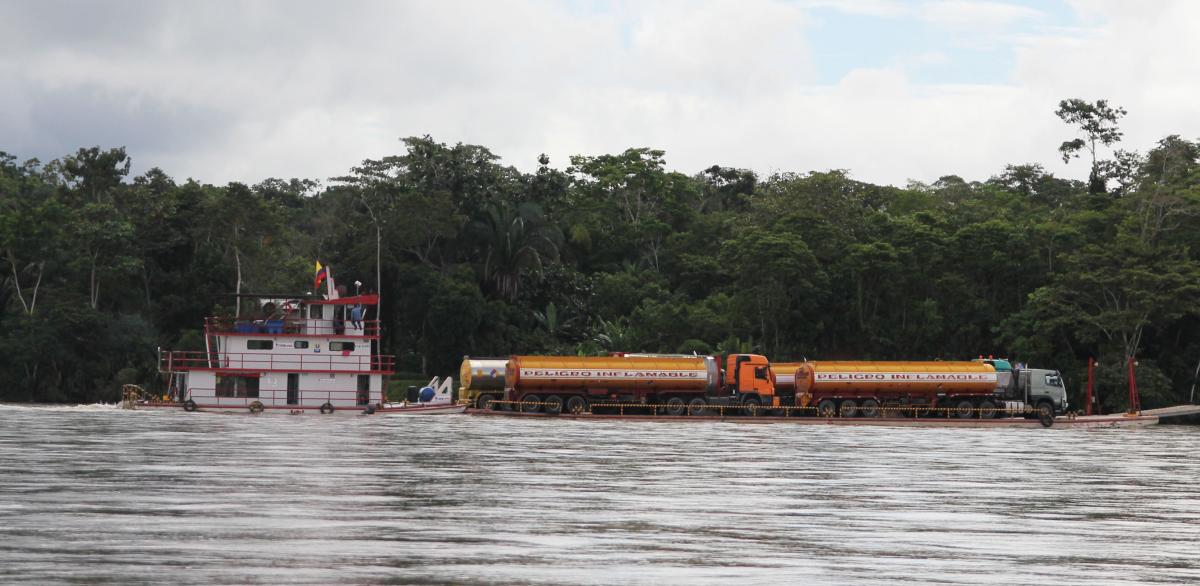
The high court of Ecuador’s Pastaza province on July 12 upheld a lower court ruling to protect the land rights of the Waorani indigenous people from oil drilling. The Pastaza Court of Justice rejected the Environment Ministry’s appeal of the lower court decision to bar plans to open 180,000 hectares of Amazon rainforest to oil development before “prior consultation” with the Waorani is carried out. (AFP, July 12) Simultaneously, however, the Ministry approved the environmental assessment plans to drill for oil in a sensitive area of Yasuni National Park, where isolated or “uncontacted” indigenous peoples are believed to be living.
The site at Ishpingo is the last field of the controversial Ishpingo-Tambococha-Tiputini (ITT) project within the borders of the park. Saving Yasuni from oil extraction has been a priority for conservationists since then-president Rafael Correa launched the ITT initiative in 2007, seeking international donations in return for keeping the oil in the ground. The initiative collapsed in 2013.
Ishpingo is the most controversial of the three ITT fields, as it overlaps with the reserve’s Intangible Zone, created to protect two “uncontacted” indigenous communities of the Tagaeri and Taromenane peoples. The government claims it will not expand into this area, and has dropped the oil lease from 125 to 25 hectares. But conservationists are alarmed by any encroachment on the area. In May, President Lenín Moreno signed a new decree that allows oil platforms to be built within the 10-kilometer-wide buffer area of the Tagaeri-Taromenane Intangible Zone (known by its Spanish acronym ZITT).
Tiputini was the first oil-field of the ITT project to be opened for oil extraction in 2016, and the Tambococha field followed in 2018. From these two fields alone, the ITT currently produces 66,268 barrels of oil per day. With Ishpingo finally open, the government’s goal is to extract 90,000 barrels of oil per day from ITT by the end of the year.
Environmentalists thought they saw a hope of salvaging part of the Yasuni conservation project in a popular referendum held in February 2018. The new government of Lenín Moreno asked Ecuadorans seven questions addressing economic, political, judicial and environmental policy. Question seven read: “Are you in favor of increasing the Intangible Zone by at least 50,000 hectares and reducing the oil extraction area in Yasuní National Park from 1,030 to 300 hectares?” More than 67% voted yes on this question.
Then in May, President Moreno finally signed Decree 751, which ordered the expansion of the ZITT by 59,000 hectares in the east—but said nothing about scaling back oil extraction activity. Instead, it included an extra clause that allows oil platforms to be built within the buffer zone of the ZITT. (Mongabay, July 5; El Universo, Guayaquil, May 22)
In another move that angered environmentalists, the Moreno government signed a “cooperation” agreement with Washington in June to allow US military planes to use the airport of San Cristobal, in the Galápagos Islands, for “anti-drug” operations in the Pacific. (TeleSur, June 12)
These developments come after the International Monetary Fund approved a $4.2 billion three-year loan for Ecuador. IMF managing director Christine Lagarde said the aid will support the government’s economic reforms, including a wage “realignment,” gradual lowering of fuel subsidies, and reduction of public debt. “The Ecuadoran authorities are implementing a comprehensive reform program aimed at modernizing the economy and paving the way for strong, sustained, and equitable growth,” Lagarde said. (AFP, March 12)
But there are concerns about who will bear the cost of these “reforms” and “modernizations.” Last year, a UN human rights expert called on Ecuador’s government to “protect the rights of indigenous peoples as a surge in demand for extractive resources and new development projects puts additional pressure on the indigenous population.”
UN Special Rapporteur on the rights of indigenous peoples, Victoria Tauli-Corpuz, urged the government to take action to build the plurinational and multicultural society that was envisioned in the 2008 constitution. “A plurinational state has not yet been achieved. True plurinationality requires respect of indigenous peoples’ rights to their lands, territories and resources as well as permanent institutions that allow for the participation and autonomy of indigenous peoples and nationalities in shaping their self-determined development,” said Tauli-Corpuz. (OHCHR, Nov. 29)
Photo via Mongabay




